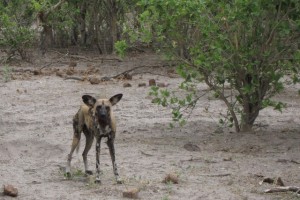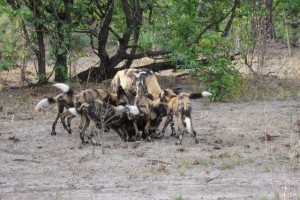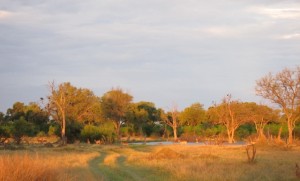The weather this morn, chilly. I have to wear a jacket to stay warm while we ply the trails looking for whatever the wilderness will cough up. Since there is not the abundance of animals we have been use to, here in Khwai, our guide has resorted to tracking. Debbie sits on the same side of the Toyota as the guide and she has been learning to identify the different tracks and to tell how recently they have been made. She has got quite good at finding hippo tracks and we think maybe she could open her own guide shop specializing in all things hippo. I’m sure there is a market for such just waiting to be tapped.
Today our pray is the African Wild Dog. There is a pack of these creatures that roams these parts and we set out to find them. African Wild Dogs are very rare and to see them is akin to spotting a Yeti, yet Pat thinks we can find them so we try. Luck is with us, there are tracks and they were made last night. We are able to follow them for a ways because often the animals use the car paths to move about and the dogs are no different in that respect. We come upon an area where the dogs have ‘played’ for a while. There are 4 adults and 6 pups in this pack so there is a lot of rough and tumble being acted out. It is hard to find which direction the dogs went from there but Pat feels they would go north, a fisherman’s instinct, so we head north. We drive aimlessly, left on this road and right on that one. A few impala here and there, suddenly, with the words ‘honey badger’ emerging from Pat’s mouth, he again jumps into action, we are chasing alongside a very fast and agile honey badger. The whole time we were in Tanzania with L&R, L wanted to run into a honey badger, but they are for the most part nocturnal and we did not find one. Today we see one during the daylight hours. He is very fast and good at keeping distance and the thickets between us and him. The pictures I tried to take consist mostly of blurred leaves and branches. So L will just have to believe that we saw, however briefly, a honey badger.
Pat is sure the wild dogs are near so via radio he commandeers Pula, our cook, into assisting with the hunt. Pula talks to a self-drive tourist who spotted the dogs a while before but lost the trail. He did provide Pula with the location of where he had seen the dogs. Pula plies that area, soon we get a call stating he has found a kill and the vultures are having a feast. The dogs had hunted and killed an impala, feasted and left the rest for the scavengers. When we arrived there were a dozen or so vultures squabbling and eating the carrion. These birds have absolutely no table manners. They fight and squawk and push their way to the front of the food line with absolutely no regard for the others.
After watching the birds pick everything but the bones, this took only about 20 mins. emphasizing what pigs they are, we head out to continue our search. Changing our tactic we go west but stay in the north part of the conservation area. As we pause by the river to photo some grazing reed bucks another vehicle passes by and as always the guide stops to exchange the day’s news. One of the vehicles from his company has located the dogs. They are sleeping about 500 meters from where we were searching earlier. Zoom! We are on our way. Spotting the ubiquitous gathering of 4WD’s at any sighting, we knew we had found our morning’s prey. Unlike most of the animal kingdom we were only there to steal images. The dogs, which are usually skittish, are just lying there with full bellies. An animal’s life here can be cruel but most of the time it does not appear to be overly stressful.
Our first stop in the late afternoon was a return visit to the wild dogs. As it has been the case for this part of our journey, we are the only vehicle there. We watch for a short time and the adult dogs appear to be restless. Soon, one by one, in single file they saunter off north towards the river. The pups follow the adults. Pat says let’s follow them, they may be going for a drink of water. We are using the 4WD for what it is meant for – we are off road now. It’s hard to follow the dogs through the thicket, but we manage to track them to the river. On the opposite bank of the river there is a troupe of baboons intently observing the movement of the dogs. On our side of the river, the adult dogs are not fearful, but the puppies keep their distance as baboons can be dangerous to them. The puppies depart on their own, soon followed by the adults, all without taking a drink. We loose track of the dogs in the thicket. The puppies return to the spot where we initially found them.
There is commotion in the trees and the adults are on the hunt. Impala are running and leaping every which way. One of the adults returns to the puppies with a piece of meat which they greedily devour. They understand that they are supposed to follow the adult back to the kill site. We dutifully join the end of the line. As we are watching the puppies eat the remainder of a baby impala, there is another disturbance in the trees. Two impala fly by at top speed with two wild dogs chasing. We are on the move too. In no time, one impala is brought down and the feasting begins anew. These dogs are fast. The adults had eaten most of the first kill, so they leave the second one for the pups. The impala is quickly consumed.
We are on a “night game drive”, so we stay out past sundown. Once it turns dark, Pat uses a flashlight to locate the eyes of the animals. We are looking for red or orange eyes of cats and predators. Blue eyes are impala (day time creatures) and we do not focus on those as we do not want to show the predators where they are.
We see hippos, their great grey bulk shining in the flashlight beam, munching grass close to the water channel. When we are almost back to camp we spot a python gliding over the ground. It doesn’t oscillate as it moves forward but travels in a straight line.
The day, which started off cool, heated up and has cooled off again. We are back in our jackets as we dine in the outdoors.



